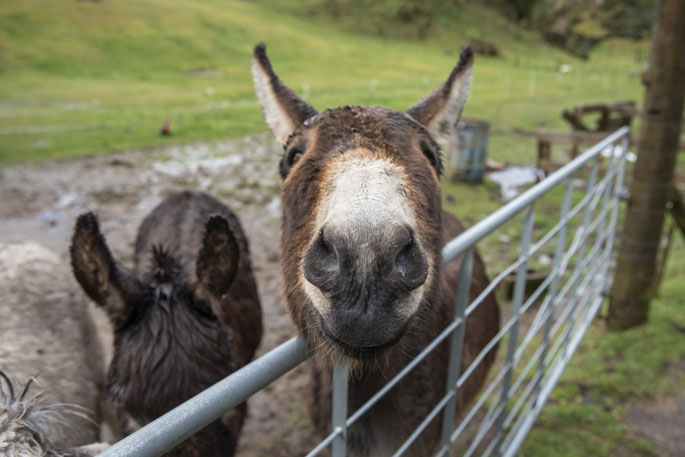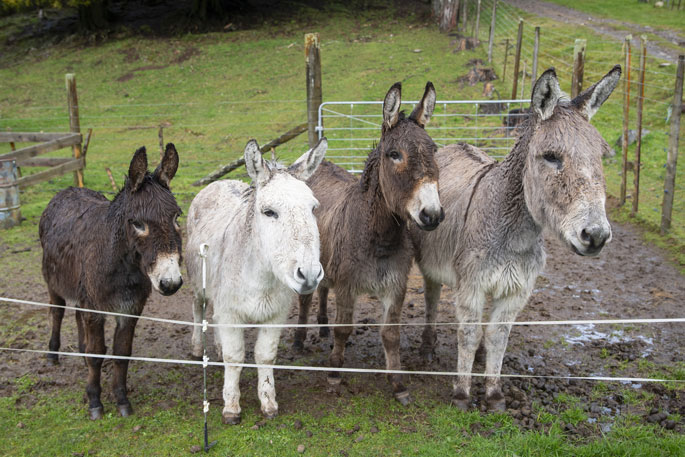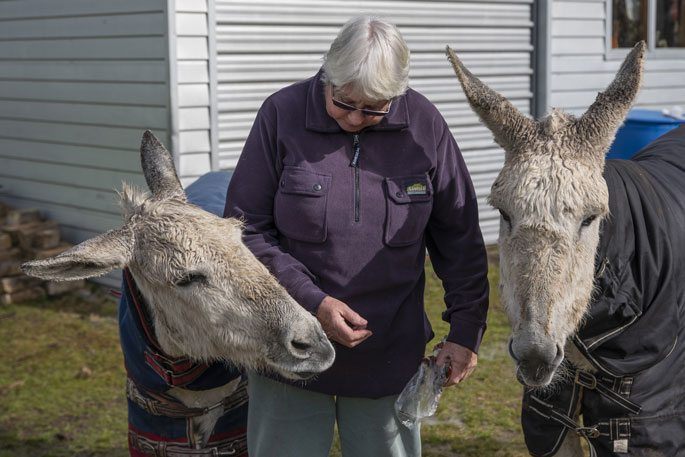The donkey derives from the African wild ass and is adapted for living in harsh, hot conditions with sparse dry vegetation.
Domesticated in Africa some 5000 to 7000 years ago it is still used today in underdeveloped countries as transport and a beast of burden. In the developed world the donkey is regarded as a pet.
Lack of knowledge on caring for a donkey has unfortunately led to many being neglected or mistreated and abused. Luckily, in New Zealand, there is a network of people like Pauline Sainsbury, who runs a donkey rehoming centre in the Mamakus, near Rotorua.
“Donkeys come into our care for many reasons and not always because they have uncaring owners. A bereavement, marriage breakup or owners too elderly to look after them can lead to a donkey needing to be relinquished,” says Pauline.
A donkey can live until it is 40 years old, so if someone in their 40s or 50s gets one, their donkey could outlive them.
“However many need rehoming due to behavioural issues or ill-health caused by mistreatment or poor diet.”
Rescuing donkeys
Pauline grew up on a drystock farm in Tirohia and is a “horse person”. She bought 10 acres in the Mamakus and had horses there. Her daughter, Carly, worked as a trekking guide until the company closed down in the early 2000s, leaving some donkeys homeless.
“She said I’d take them as I had land! I quite liked donkeys, but I knew nothing about caring for them and I already had five horses on my land.”
Pauline contacted the Donkey and Mule Protection Trust whose rep managed to find a home for them.
“Once my horse numbers were down a bit, I said I wouldn’t mind taking a couple of donkeys in myself.”
 Donkeys are very nosey and curious. Photo: Catherine Fry.
Donkeys are very nosey and curious. Photo: Catherine Fry.
Her first rescue was Milo, a neglected jack (male), who had been passed on with a property each time it was sold. Pauline describes him as “gelded but wild as hell, who’d been living in a back field alone with no company, care or stimulation”.
His hooves were a mess, his halter had grown into his face, and it took several strong men to load him onto the float.
“I slowly gained his trust, fed him correctly and was able to harness break him with the help of my good friend Massey. He pulled a cart and loved competing doing obstacle courses.”
Milo passed in 2017, aged 24 after a happy 16 years with Pauline. She had also rescued many other donkeys by then and has a reputation for taking on the difficult ones with the help of Carly, who lives next door.
Donkey problems
“The donkey is a desert animal and needs plenty of roughage from dry food. If allowed to eat just rich green pasture, they become overweight and can develop laminitis.”
They can also suffer from overgrown teeth which cut into their mouth, and overgrown hooves which cause pain and discomfort. They need regular farrier visits and yearly dentals.
“Jacks can also be an issue as once they reach three years old, entire ones can become very predictable and aggressive. Jacks need to be gelded and handled.”
Donkeys fare to a certain level with other livestock, but they need to be kept with another donkey to be happy. Even in a herd situation, they pair up and form deep bonds with their partner.
“They are very curious, intelligent animals which also form deep bonds with their owners, seeking interaction and enjoying a groom or cuddle.”
 Four handsome jacks: Neddy, left, Mintie, Weatherby and Monty. Photo: Catherine Fry.
Four handsome jacks: Neddy, left, Mintie, Weatherby and Monty. Photo: Catherine Fry.
They need to be busy and have a purpose. Once they are settled and quiet, they are playful and love human interaction such as walks, cart pulling and giving children rides.
Due to their desert origins, donkey coats aren’t waterproof and once wet, they can get cold and develop respiratory ailments or pneumonia.
“They need a good shelter and at the first sign of rain you can see them all herding in there.”
Funding and support
Pauline has rehomed more than 300 donkeys since 2005, with only four “bounce backs”. She has four donkeys of her own and 12 permanent sponsored donkeys.
“I couldn’t do what I have done without the financial backing and support of the Donkey and Mule Protection Trust NZ. My permanents are not suitable for rehoming due to health or behavioural issues, but I am able to give them a good life until they die.
“People sponsor them through the Trust to ensure they are fed well, and vet care is covered.”
The Trust also handles the adoptions. Properties are inspected and suitable matches have a trial period before formal adoption. There is a network of volunteers throughout the country supporting the Trust with its work.
Pauline welcomes visitors to come mingle with her resident donkeys. She can be contacted through the Donkey and Mule Protection Trust's website - www.donkeymuletrust.org.nz



0 comments
Leave a Comment
You must be logged in to make a comment.